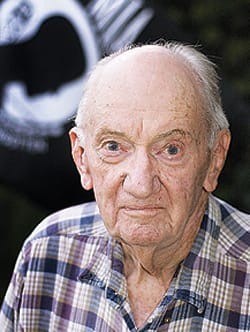Burlage: Former WWII POW and Leatherneck staffer, George Burlage dies

Master Sgt. George E. Burlage who survived as a POW of the Japanese in WWII died Nov. 30, 2008 after a brief illness. He was 90.
George Edward Burlage of Denton, TX died November 30, 2008 at Denton Presbyterian Hospital after a brief illness. He was 90 years old.
Burlage grew up during the Great Depression and following his graduation from junior college, he enlisted in the United States Marine Corps in 1939 and was stationed at Cavite in the Philippines. George was captured by Japanese forces after the Battle of Corregidor on May 6, 1942. He was held as a prisoner-of-war by the Japanese for 40 months and worked as a slave laborer in the Philippines and in the Mitsubishi coal mines in Japan.
One of the few bright spots Burlage recalls was when one of the POWs found some tar and everyone began chewing it.
“It make the teeth feel cleaner as no one had a tooth brush for years,” he wrote. But he said the big surprise was how quickly the Japanese teens who worked around the mine joined in the tar-chewing practice. “It didn’t last long. The Japanese honchos stopped it in a hurry. But I do think that this was the start of Americanizing the Japanese youth,” Mr. Burlage writes on a blog by Steve Blow.
He was also a survivor of the infamous “hell ships” that carried American prisoners-of-war from the Philippines to Japan after the American liberation of the Philippines in 1944. When George was liberated from Japanese captivity in September 1945, he weighed 118 pounds.

Of his experience as a POW he told his local paper in 2004:.."We would work all day to try to hack down a 100-year-old mango tree," he said. The prisoners were rousted at daylight and fed some watered-down rice. They were given more rice in the field at noon and then marched back at dark and fed rice again. "The same thing: rice, rice, rice all day," Burlage said. "There wasn’t much of it, but it was rice." Because of the inadequate diet, he contracted dengue fever and came back with beriberi, he said. Two main groups of workers on each end of the field worked toward the middle, he said. The POWs sabotaged the project by banging on the survey stakes to throw off the levelness of the field, he said.--From a blog entitled "One of the greatest generation - WWII vet speaks at local Veterans' Day event "
After World War II, George served on the USS New Jersey and became a public affairs liaison for the Marine Corps. He was a staff member of the USMC Leatherneck magazine and served as a correspondent in the Korean Conflict. He served as the base communications director at Camp Lejeune, North Carolina, where his daughter was born, and at Kaneohe Bay, Hawaii, retiring from the Marines in 1959.
George and his family moved to Denton in 1959, where he finished his undergraduate education in journalism at what is now the University of North Texas. He was the regional editor of the Denton Record Chronicle from 1960-1963. He became the public affairs officer for the Southwestern Region of the Federal Aviation Administration in 1963, retiring in 1983. While at the FAA, he was also a member of the North Texas Council of Governments and other governmental agencies. He earned his Master of Arts degree in public administration from UNT in 1969. His thesis, which was on the planning and design of the Dallas-Fort Worth International Airport, was used as a model for the concept of local federalism for many years.
After his official retirement from civil service, George was very active in community organizations and in local volunteer work. He served as president of the local chapter of the National Association of Retired Federal Workers, volunteered at Ann’s Haven Hospice and at the Community Food Room, and was active at the First Christian Church, where he became a member in 1959. In the 1990s, he became very interested in genealogy, tracing his family back to the Mayflower. He was a member of the Sons of the American Revolution and of the Society of Mayflower Descendants. He was also active in many veterans organizations including American Ex-Prisoners of War, Veterans of Foreign Wars, Disabled American Veterans, USMC Combat Correspondents Association, and the Fleet Reserve Association. He was awarded the Order of the Purple Heart and the Bronze Star in addition to many other citations. George was also a member of the Society of Professional Journalists-Sigma Delta Chi. Senator Zell Miller of Georgia dedicated his book “Corps Values” to George in 1998. George was honored as an outstanding UNT political science alumnus in 2005.
George often said that one of his greatest accomplishments was having his yard named as “Yard of the Month” by Keep Denton Beautiful in 2001. Gardening was one of his passions, along with cooking and reading.
Extremely dedicated to education, George started an endowment at the University of North Texas for students majoring in English with a goal of teaching and an endowment with the Denton Public School Foundation for Ryan High students who plan to pursue a career in education. He was a member of the President’s Council at the University of North Texas.
He is survived by his daughter Georgianne Burlage and two granddaughters, Rachel Burlage and Leah Burlage, all of Denton. His brother and two sisters also preceded him in death. He is also survived by his “little buddy” Peanut.
Memorials may be made to the Burlage Family Scholarship, UNT Foundation; to the Burlage Family Scholarship, Denton Public School Foundation; or to the Salvation Army.
–Written by his daughter, Georgianne Burlage